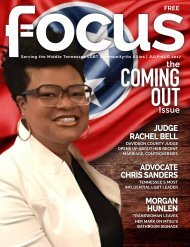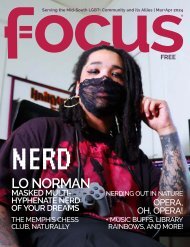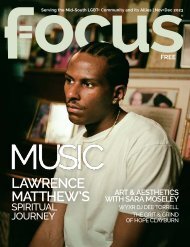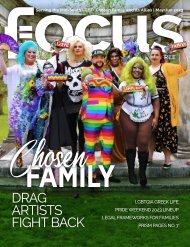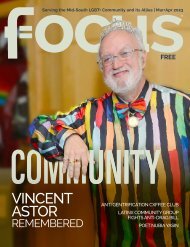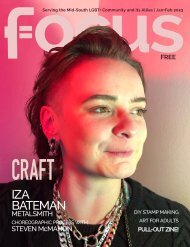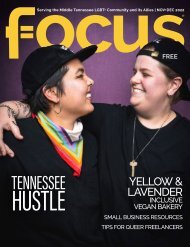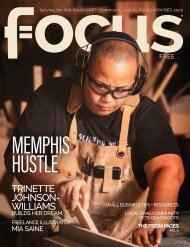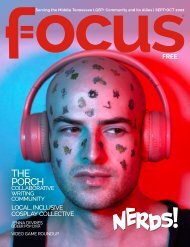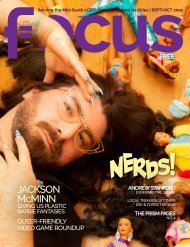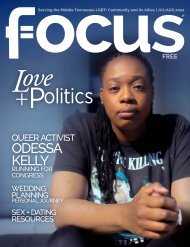You also want an ePaper? Increase the reach of your titles
YUMPU automatically turns print PDFs into web optimized ePapers that Google loves.
Hispanic and Latin<br />
communities around the<br />
world have been using and<br />
modifying these genderinclusive<br />
structures for<br />
some time and I think there<br />
is more of a consensus<br />
starting to build.<br />
When I started teaching<br />
my own classes with LC<br />
Spanish, I knew I was going<br />
to have students of all<br />
genders and identities, so<br />
it was important to me that<br />
I teach inclusive language<br />
throughout. In a time when<br />
trans, non-binary, and<br />
gender nonconforming<br />
folks are under attack,<br />
I set out to create a<br />
learning environment<br />
where students feel safe,<br />
recognized, and affirmed. I<br />
also want all of my students<br />
to have access to the<br />
appropriate language when<br />
they encounter someone<br />
who doesn't identify only<br />
with the masculine or<br />
feminine.<br />
What are the challenges<br />
to linguistic inclusivity in<br />
a language like Spanish?<br />
And how are those being<br />
addressed?<br />
It's been a topic of<br />
conversation and debate<br />
for many years on how to<br />
make the Spanish language<br />
more inclusive to different<br />
genders because Spanish<br />
is an inherently machista<br />
and binary language. For<br />
example, if there is one<br />
masculine presence in a<br />
group of people, the words<br />
for "we," "y'all," and "they<br />
(plural)" all default to the<br />
masculine form, even if<br />
the rest of the group is<br />
all feminine or nonbinary.<br />
Additionally, all nouns<br />
are either masculine or<br />
feminine (unlike German,<br />
for example, which also<br />
has a neutral). One early<br />
attempt to include more<br />
people was using the<br />
@ symbol to represent<br />
both the masculine and<br />
feminine endings. So<br />
instead of using "nosotros"<br />
(masculine) or "nosotras"<br />
(feminine) for "us/we"<br />
it would be "nosotr@s"<br />
or "Latin@" instead of<br />
"Latino" or "Latina." This<br />
is problematic because<br />
it reinforces the gender<br />
binary and excludes any<br />
other variation in gender,<br />
erasing nonbinary people.<br />
Another intermediate<br />
solution has been to<br />
use the letter "x" as a<br />
substitute. So for example<br />
"nosotrxs" or "Latinx." This<br />
is generally more inclusive,<br />
but ends up being pretty<br />
much unpronounceable in<br />
Spanish. Another issue with<br />
these two options is that<br />
neither one has a gender<br />
neutral subject pronoun<br />
(like the singular "they" in<br />
English). The consensus<br />
I've been seeing lately and<br />
what I teach in my classes<br />
is to replace the masculine<br />
or feminine ending with<br />
"e" (nosotres, Latine).<br />
This also comes with the<br />
benefit of a gender neutral<br />
subject pronoun, "elle."<br />
It is relatively easy to<br />
pronounce, and it generally<br />
makes sense grammatically.<br />
In addition to pronouns<br />
and new endings for<br />
traditionally "masculine"<br />
and "feminine" nouns or<br />
adjectives, are there other<br />
developments happening<br />
in inclusive language<br />
options for Spanish?<br />
I think this is an area<br />
where the language can<br />
still grow. I haven't seen<br />
good gender-neutral<br />
alternatives to words like<br />
"madre" (mother), "padre"<br />
(father), "padres" (parents).<br />
In many cases though, the<br />
gender neutral "e" ending<br />
helps modify gendered<br />
nouns and adjectives. For<br />
example, when talking<br />
about professions, you<br />
could say "abogade"<br />
instead of "abogada" or<br />
"abogado" for lawyer.<br />
This is all really hopeful to<br />
hear. Do you have an idea<br />
of what the reception has<br />
been to these additions<br />
and adaptations to the<br />
language? Are queer<br />
communities facing any<br />
pushback or criticism over<br />
them?<br />
It has been a mixed<br />
reception, from what I have<br />
observed. I think in the past<br />
few years queer Spanishspeaking<br />
communities have<br />
embraced gender-neutral<br />
and inclusive language<br />
more and are now getting<br />
traction in pushing it out<br />
to the broader Spanishspeaking<br />
world. But at the<br />
beginning lots of people<br />
rejected the term Latinx.<br />
The Spanish-speaking<br />
world is incredibly diverse,<br />
and there are conservative,<br />
reactionary segments<br />
to it. Plenty of Spanishspeakers<br />
reject genderneutral<br />
language because<br />
they are not accepting<br />
of trans and nonbinary<br />
identities in the first place.<br />
Some people also see the<br />
words Latinx or Latine as<br />
a U.S.-centric imposition<br />
of language and ideology.<br />
When I introduce genderneutral<br />
and inclusive<br />
language in my classes, I<br />
make sure to point out that<br />
not every Spanish-speaker<br />
my students encounter<br />
will know or accept that<br />
language.<br />
Is there anything else<br />
we should know about<br />
inclusive language<br />
practices in Spanish<br />
specifically, or in non-<br />
English languages<br />
generally?<br />
A good rule of thumb for<br />
inclusivity in any language<br />
is to follow the lead of<br />
the people who hold the<br />
identity you are describing.<br />
You can always ask people<br />
what words they prefer to<br />
use to refer to themselves.<br />
This also goes for identities<br />
other than gender and<br />
sexuality. Spanish is<br />
starting to come around<br />
on having more respectful<br />
and inclusive words for<br />
describing race, ethnicity<br />
and disability, for example.<br />
I think that vocabulary is<br />
vitally important to learn<br />
as well because of the<br />
intersectionality of queer<br />
identities.<br />
Additionally, participating<br />
in a live Spanish class, and<br />
learning another language<br />
in general, helps sharpen<br />
the skill of correcting<br />
yourself when you make<br />
a mistake. This is a really<br />
necessary skill for being<br />
in relationship with people<br />
experiencing a transition<br />
(using different pronouns,<br />
for example). You have to<br />
learn to correct yourself in<br />
the moment, perhaps study<br />
the structure on your own<br />
time, and move on quickly<br />
from mistakes so they don't<br />
derail a conversation.<br />
JUL+AUG <strong>2023</strong> | focuslgbt.com | Memphis Green 33




